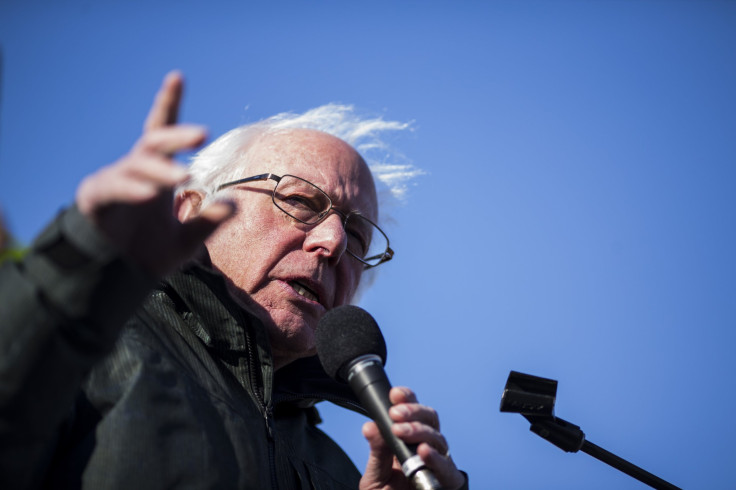New York Times Fact-Checks Bernie Sanders On Campaign Trail

Sen. Bernie Sanders, I-VT, has modestly misled or exaggerated some of his statements while campaigning for the 2020 Democratic nomination, according to a fact-checking report in the New York Times this weekend.
Sanders, the longest-sitting Independent senator in history, was critiqued by the Times on the accuracy of some statements associated with a Medicare-for-all initiative, how his concerns for climate change were received in the 2016 presidential election cycle and his criticism of the Trump administration’s proposed cuts to Medicare and the increased number of uninsured Americans since Trump took office.
WATCH: Poll shows the less you pay attention, the more likely you are to support Sanders #MTP #IfitsSunday
— Meet the Press (@MeetThePress) May 26, 2019
Bernie Sanders is not the "hot new kid anymore," @yamiche says pic.twitter.com/faUAnrbfuT
Earlier this month during a campaign stop in Asheville, North Carolina, Sanders told an audience, “Four years ago, when we said that health care is a human right, we were told that was a radical idea, that the American people wouldn’t accept it. A poll just came out the other day, consistent with other polls: 70% of the American people support Medicare-for-all single-payer program.”
While a single-payer approach to health insurance has grown in popularity since Sanders touted it during his 2016 campaign, the Times reported not all polls show 70% of Americans supporting it. However, most polls do show a majority of Americans supporting a Medicare-for-all program.
Reuters has found 60-70% support such a program but the number drops to 30-40% if income taxes will increase. Likewise, 65% backed the plan, according to RealClearPolitics, but the number dropped to 55% when respondents were told the system would eliminate private insurance. A Kaiser Family Foundation polled pegged those favoring Medicare-for-all at 53-59%.
Sanders also said in Asheville four years ago that when he told a debate moderator that climate change was the greatest threat facing the nation, that the commentator laughed, which isn't accurate.
Bernie Sanders says "ideas that he had in 2016 that people said were out of step for the Democratic Party are now very much a part of the party's mainstream. Why then if that's the case and to some degree it is, is the senator struggling this time?" - @JohnKingCNN #InsidePolitics pic.twitter.com/RQInU3pAVH
— CNN (@CNN) May 26, 2019
The commentator in question was CNN’s Anderson Cooper, who asked the five major Democratic candidates in October 2015 what they considered the “greatest national security threat” to the U.S., with Sanders responding, “the global crisis of climate change,” to which the audience applauded. Video of the debate doesn’t show Cooper or anyone else laughing at the comment. Further, Sanders was the second of the five to mention climate change. Former Maryland Gov. Martin O’Malley included climate change in a trilogy of answers, also naming the Islamic State and Iran’s potential nuclear threat.
In a second debate following a terrorist attack in Paris, Sanders was asked if he still considered climate change the most serious threat and he answered, “absolutely,” tying terrorism directly to climate change. After the debate, some Republicans criticized Sanders for his position but, again, there was no laughter in response to his comment.
The Times reported that Sanders also exaggerated the Trump administration’s proposed cuts to Medicaid, Medicare and Social Security. The administration’s 2020 budget does call for reductions but they are not as steep as Sanders has claimed. Trump’s budget calls for repealing and replacing the Affordable Care Act with a plan sponsored by Republican Sens. Lindsey Graham of South Carolina and Bill Cassidy of Louisiana.
Sen. Bernie Sanders speaks in Montpelier, VT: "We know that climate change is real." pic.twitter.com/slym6mnUbS
— The Hill (@thehill) May 26, 2019
The proposed changes would cut Medicaid by $1.5 trillion over a decade, as Sanders has said, but $1.2 trillion would be distributed to states as block grants for development of their own programs. Altogether Trump’s cuts would amount to a net loss of $777 billion in spending on Medicaid and health care subsidies under the Affordable Care Act. After some accounting shifts, the net reduction to Medicare would be somewhere between $500 and $600 billion depending on which expert you rely on. Sanders said in Birmingham, Alabama, earlier this month that Trump’s “budget calls for a $1.5 trillion cut in Medicaid over a 10-year period, $800 billion cut in Medicare and billions in Social Security.”
Finally, in Madison, Wisconsin in April, Sanders said, “Today, under the Trump administration, 7 million people have already lost their health insurance.”
A Gallup poll in January showed an uptick in the uninsured rate from 10.9% in the fourth quarter of 2016 to 13.7% in the same period in 2018, increasing the number of uninsured Americans by about 7 million.
However, other sources do not indicate as large an increase. The National Center for Health Statistics reported 29.7 million uninsured in the first nine months of 2018, compared with 28.2 million for the same period in 2016, resulting in an increase of 1.5 million. The Commonwealth Fund found the uninsured rate among adults 19 to 64 was statistically unchanged from 2016 to 2018, despite Trump administration efforts to hamstring the Affordable Care Act, the Times reported.
© Copyright IBTimes 2024. All rights reserved.





















